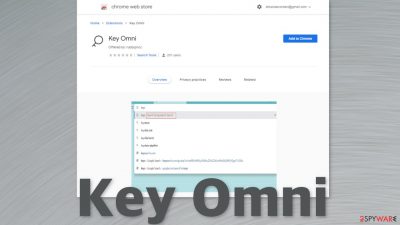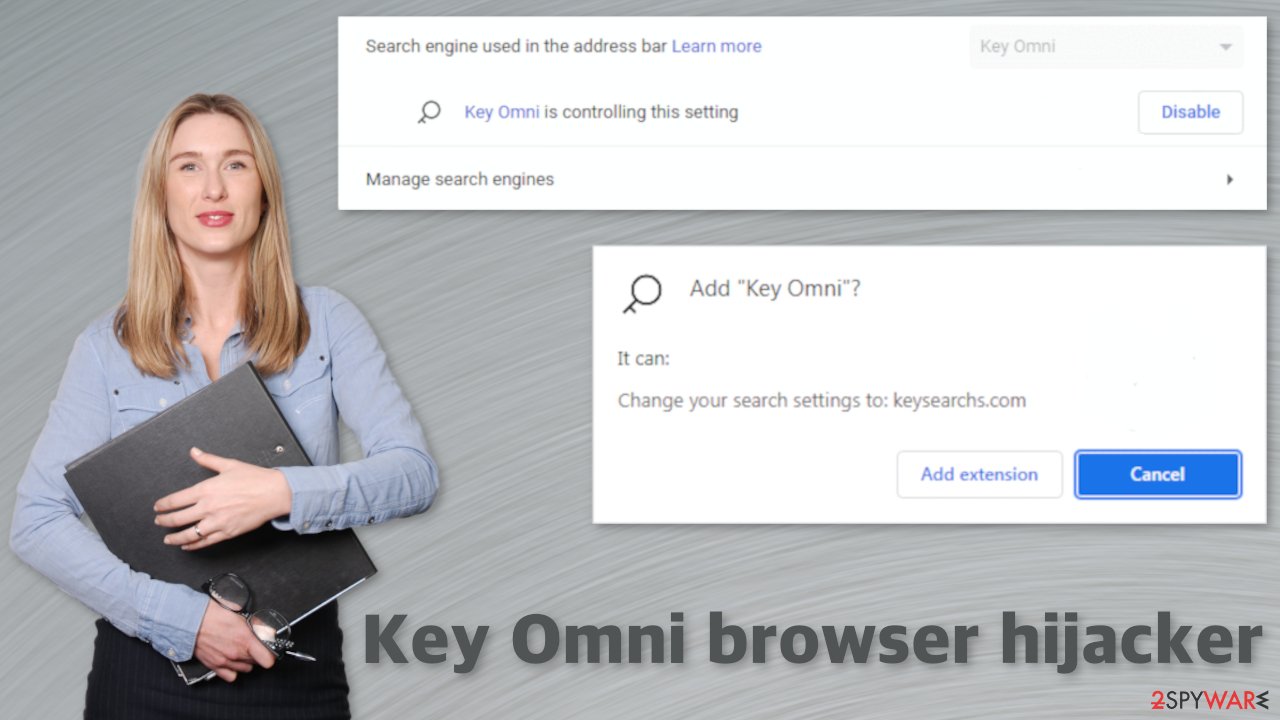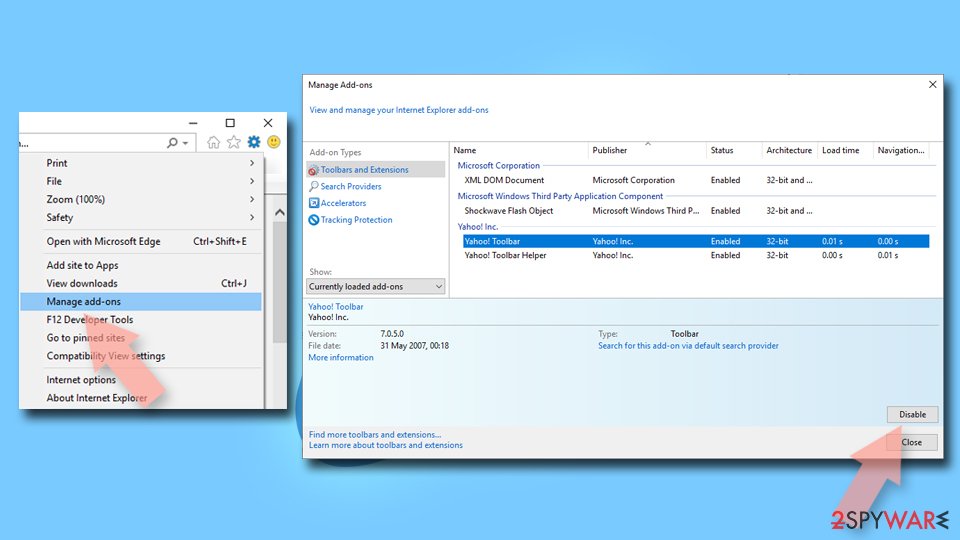Key Omni browser hijacker (fake) - Free Guide
Key Omni browser hijacker Removal Guide
What is Key Omni browser hijacker?
Key Omni claims to be the best way to search but instead, it redirects users to questionable sites

Key Omni is a shady browser extension, classified as a browser hijacker that should not be trusted. On the Chrome web store, the add-on does not have any reviews and the description clearly states false information – that it provides “optimized search powered by Google”. When you add this plugin, it immediately automatically opens a suspicious site in a new tab. It is hard to see any benefits in having this installed in your browser.
Generally, browser extensions are used because they provide some kind of additional perks that a default browser cannot. Add-ons that can block ads, and suspicious websites, search the database for the best coupon codes are some of the most popular types. But there are thousands more to choose from. Although we often recommend our readers to trust only official online stores, that does not mean that some bad apples do not slip through the cracks and you still need to be careful when choosing what to add to your digital space.
| NAME | Key Omni |
| TYPE | Browser hijacker; potentially unwanted program |
| SYMPTOMS | Browser's default search engine gets changed to keysearchs.com |
| DISTRIBUTION | Chrome web store; shady websites; bundled software; deceptive ads |
| DANGERS | The browser plugin can open random links, and redirect users to dangerous websites |
| ELIMINATION | The removal method depends on how the extension was added; you may just have to go to your browser settings or deploy anti-malware tools |
| FURTHER STEPS | Use FortectIntego to optimize your machine and fix any remaining damage |
This application is created for the purpose of generating revenue from PPC advertising[1] and data gathering. The developers do not have any interest in proving actual value for you. So the search results that it opens can lead to misinformation or dangerous websites where you can get tricked by various phishing techniques and provide your personal information to untrustworthy individuals, download PUPs, or even malware.[2]
Ways browser hijackers are spread online
Because the extension does not have any reviews on the platform and has very few users, you can suspect that this is not the primary source of distribution. These types of apps can also be spread on shady websites that engage in illegal activities or by simply creating a false ad and spreading it on the Internet. Usually, users do not even realize that they added an extension when it happens. It could also be a potentially unwanted program[3] that is causing this.
PUPs are most often spread on unofficial freeware distribution sites. The owners of such sites still need to make money, so they include additional programs in the installers without disclosing it on the site. They hope that most will rush through the installation process and will not notice the bundled software. Unfortunately, that's what happens most of the time.
When looking for browser plugins, pay attention to how many users it has, and if it has reviews – if it does, look at them and see if they look legitimate. Some people buy fake reviews that are posted by bots. They usually are repetitive and do not actually give any feedback, for example, “Excellent”, “Very happy”, etc.

In the picture above, you can see a browser prompt that users receive when they add an extension. Users are informed about what changes the add-on will be able to perform. In this case, you can see that the browser is saying that search settings will be changed to keysearchs.com but many do to read the fine print, and just click without paying attention.
Sometimes you can also see a prompt asking if you agree to the usage of cookies. They are used to track your online behavior – your IP address, what websites you visit, links you click on, and what you purchase. If in the wrong hands, this data can be used in a variety of ways. That is why we recommend having a maintenance tool FortectIntego in your machine which can clear your browsers automatically and delete all that information without a trace.
Get rid of the intruder
The first thing you should do is go to your browser settings and check if you have the Key Omni extension in the list. You might have added the extension by accident or because you saw a deceptive ad for it and you thought it will be useful. Instructions for the most often used browsers are below:
Google Chrome
- Open Google Chrome, click on the Menu (three vertical dots at the top-right corner) and select More tools > Extensions.
- In the newly opened window, you will see all the installed extensions. Uninstall all the suspicious plugins that might be related to the unwanted program by clicking Remove.
![Remove extensions from Chrome Remove extensions from Chrome]()
MS Edge:
- Select Menu (three horizontal dots at the top-right of the browser window) and pick Extensions.
- From the list, pick the extension and click on the Gear icon.
- Click on Uninstall at the bottom.
![Remove extensions from Edge Remove extensions from Edge]()
MS Edge (Chromium)
- Open Edge and click select Settings > Extensions.
- Delete unwanted extensions by clicking Remove.
![Remove extensions from Chromium Edge Remove extensions from Chromium Edge]()
Mozilla Firefox
- Open Mozilla Firefox browser and click on the Menu (three horizontal lines at the top-right of the window).
- Select Add-ons.
- In here, select unwanted plugin and click Remove.
![Remove extensions from Firefox Remove extensions from Firefox]()
Safari
- Click Safari > Preferences…
- In the new window, pick Extensions.
- Select the unwanted extension and select Uninstall.
![Remove extensions from Safari Remove extensions from Safari]()
Internet Explorer:
- Open Internet Explorer, click on the Gear icon (IE menu) on the top-right corner of the browser
- Pick Manage Add-ons.
- You will see a Manage Add-ons window. Here, look for suspicious plugins. Click on these entries and select Disable.
![Remove add-ons from Internet Explorer Remove add-ons from Internet Explorer]()
How to remove PUPs and avoid them in the future
If the previous removal method did not work, you most likely have a potentially unwanted program operating in your system. In that case, simply removing the extension and changing your settings back, will not work. They will get reverted again until you completely eliminate the intruder operating in the background.
Manual removal of a Key Omni PUA can get a little complicated if the program is not named the same. You might delete the wrong apps if you attempt to do this on your own. SpyHunter 5Combo Cleaner or Malwarebytes are great professional security tools that can automatically scan your machine for suspicious processes, and eliminate them completely with all the related files. If you still want to do this yourself, you can follow the step-by-step instructions for Windows and Mac operating systems below:
Windows 10/8:
- Enter Control Panel into Windows search box and hit Enter or click on the search result.
- Under Programs, select Uninstall a program.
![Uninstall from Windows 1 Uninstall from Windows 1]()
- From the list, find the entry of the suspicious program.
- Right-click on the application and select Uninstall.
- If User Account Control shows up, click Yes.
- Wait till uninstallation process is complete and click OK.
![Uninstall from Windows 2 Uninstall from Windows 2]()
Windows 7/XP:
- Click on Windows Start > Control Panel located on the right pane (if you are Windows XP user, click on Add/Remove Programs).
- In Control Panel, select Programs > Uninstall a program.
![Uninstall from Windows 7/XP Uninstall from Windows 7/XP]()
- Pick the unwanted application by clicking on it once.
- At the top, click Uninstall/Change.
- In the confirmation prompt, pick Yes.
- Click OK once the removal process is finished.
Mac:
- From the menu bar, select Go > Applications.
- In the Applications folder, look for all related entries.
- Click on the app and drag it to Trash (or right-click and pick Move to Trash)
![Uninstall from Mac 1 Uninstall from Mac 1]()
To fully remove an unwanted app, you need to access Application Support, LaunchAgents, and LaunchDaemons folders and delete relevant files:
- Select Go > Go to Folder.
- Enter /Library/Application Support and click Go or press Enter.
- In the Application Support folder, look for any dubious entries and then delete them.
- Now enter /Library/LaunchAgents and /Library/LaunchDaemons folders the same way and terminate all the related .plist files.
![Uninstall from Mac 2 Uninstall from Mac 2]()
You should avoid installing free software from unofficial sources. We know it can get costly paying for software licenses but at least you will know that you can trust the websites, the program developers to not do anything shady.
That is why we suggest implementing some habits in your routine to keep the chance of this happening again to a minimum:
- Always choose the “Custom” or “Advanced “ installation method
- Read the Terms of Use, Privacy Policy
- The most important part is to check the file list. If you see any additional programs included, untick the boxes next to them
How to prevent from getting browser hijacker
Protect your privacy – employ a VPN
There are several ways how to make your online time more private – you can access an incognito tab. However, there is no secret that even in this mode, you are tracked for advertising purposes. There is a way to add an extra layer of protection and create a completely anonymous web browsing practice with the help of Private Internet Access VPN. This software reroutes traffic through different servers, thus leaving your IP address and geolocation in disguise. Besides, it is based on a strict no-log policy, meaning that no data will be recorded, leaked, and available for both first and third parties. The combination of a secure web browser and Private Internet Access VPN will let you browse the Internet without a feeling of being spied or targeted by criminals.
No backups? No problem. Use a data recovery tool
If you wonder how data loss can occur, you should not look any further for answers – human errors, malware attacks, hardware failures, power cuts, natural disasters, or even simple negligence. In some cases, lost files are extremely important, and many straight out panic when such an unfortunate course of events happen. Due to this, you should always ensure that you prepare proper data backups on a regular basis.
If you were caught by surprise and did not have any backups to restore your files from, not everything is lost. Data Recovery Pro is one of the leading file recovery solutions you can find on the market – it is likely to restore even lost emails or data located on an external device.
- ^ What Is PPC? Learn the Basics of Pay-Per-Click (PPC) Marketing. WordStream. Advertising Solutions.
- ^ Beware of new malware that steal browser cookies, allow hackers remotely control your web activity. CISO. From the Economic Times.
- ^ Potentially unwanted program. Wikipedia. The Free Encyclopedia.











